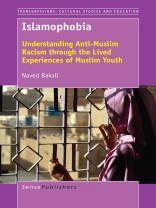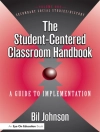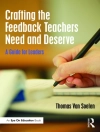The 9/11 terror attacks and the ensuing War on Terror have profoundly impacted Muslim communities across North America. Islamophobia: Understanding Anti-Muslim Racism through the Lived Experiences of Muslim Youth is a timely exploration of the experiences of young Canadian Muslims and the challenges they have encountered since 9/11. Through framing anti-Muslim racism, or ‘Islamophobia’, from a critical race perspective, Naved Bakali theorizes how racist treatment of Muslims in public and political spheres has been mediated through the War on Terror. Furthermore, he examines the lived experiences of Muslim youth as they navigate issues relating to race, gender, identity, and politics in their schools and broader society. This book uncovers systemic bias and racism experienced by Muslim youth in a climate that is increasingly becoming hostile towards Muslims. Ultimately, the findings detailed in this work suggest that anti-Muslim racism in the post-9/11 era is inextricably linked to the effects of the War on Terror in the North American context. Moreover, Islamophobia is also impacted by localized practices, policies, and nationalist debates. This book is a unique contribution to the field of anti-racism education as it examines systemic and institutionalized racism towards Muslims in Canadian secondary schools in the context of the War on Terror.
Table of Content
Acknowledgments.- Introduction: Islamophobia: Meta-Narratives and Localized Discourses of the Muslim ‘Other’ Post-9/11.- A Typical Day for Muslims in Canada?.- Muslims and the ‘Terrorist’ Dialectic.- Examining Muslim Experiences in Canadian Schools.- Organization of This Book.- Part 1. Understanding Islamophobia: History and Context.- Historicizing and Theorizing Islamophobia and Anti-Muslim Racism.- Historicizing Islamophobia.- Islamophobic Trends in North America and Europe.- Defining Islamophobia.- Critical Race Theory.- Critical Race Theory and Islamophobia.- Critical Race Theory in Education.- Conclusion.- Viewing Islamophobia through the Socially Constructed Power Relations of Race, Gender, and Class.- Introduction.- Race.- Gender.- Class and Economics.- Conclusion.- How the Muslim ‘Other’ Has Been Conceptualized in the Quebec Context.- Introduction.- Overview of Quebec History.- Understanding French Secularism in Quebec.- Multiculturalism, Interculturalism, and Managing Diversity.- Reasonable Accommodation Debates and Their Reverberations.- Racism Disguised as Secular and Liberal Feminist Discourses.- Educational Institutions in Quebec.- Conclusion.- Popular Cultural Islamophobia: Muslim Representations in Films, News Media, and Television Programs.- Introduction.- Analysis of Hollywood Films.- Islamophobic Archetypes in News Media.- The Muslim Threat in the World of 24.- Conclusion.- Part 2. Experiencing Islamophobia: Islamophobia in Practice.- Unveiling the Lived Realities of Muslim Female Students in Canadian Secondary Schools.- The Participants.- Societal Perceptions of Islam.- Experiences in Secondary Schools.- Effects of Media on Muslim Female Participants.- Menacing and Maniacal Muslims: Experiences of Muslim Male Students and Teachers.- Muslim Men’s Experiences in Secondary Schools in Quebec.- Teachers’ Perceptions of Islamophobia in Quebec Secondary Schools.- Conclusion: We’ve Jihad Enough.- Drawing Connections between Theory and Lived Experiences.- Similarities between Participants and Participant Categories.- Differences.- Understanding the Causes of Racism.- Challenging Islamophobia.- Bibliography.- Index.












